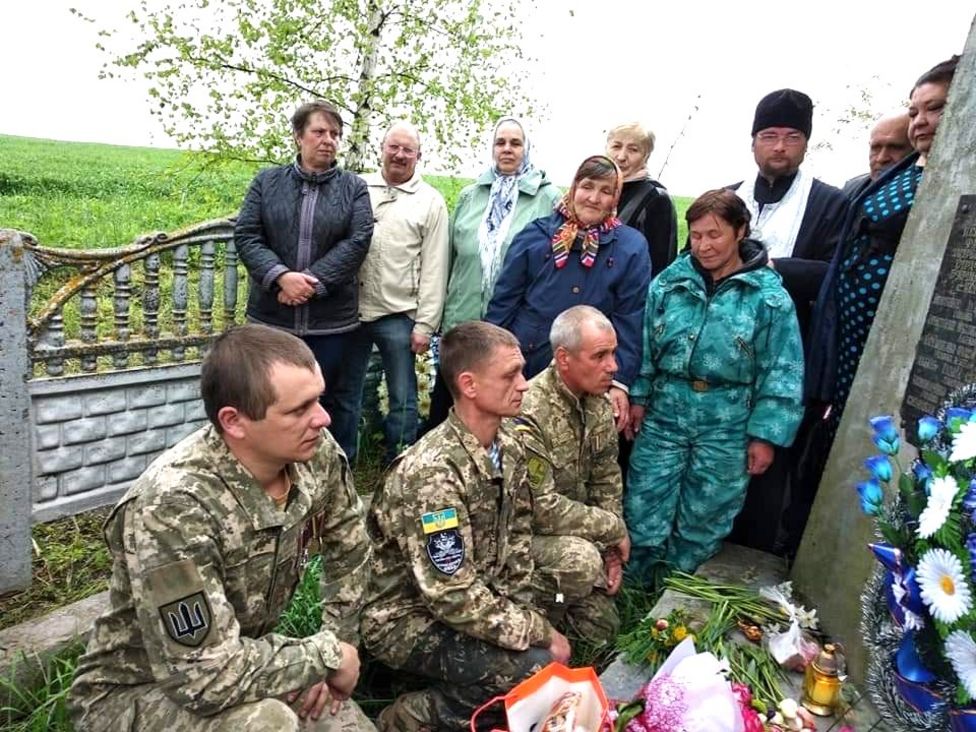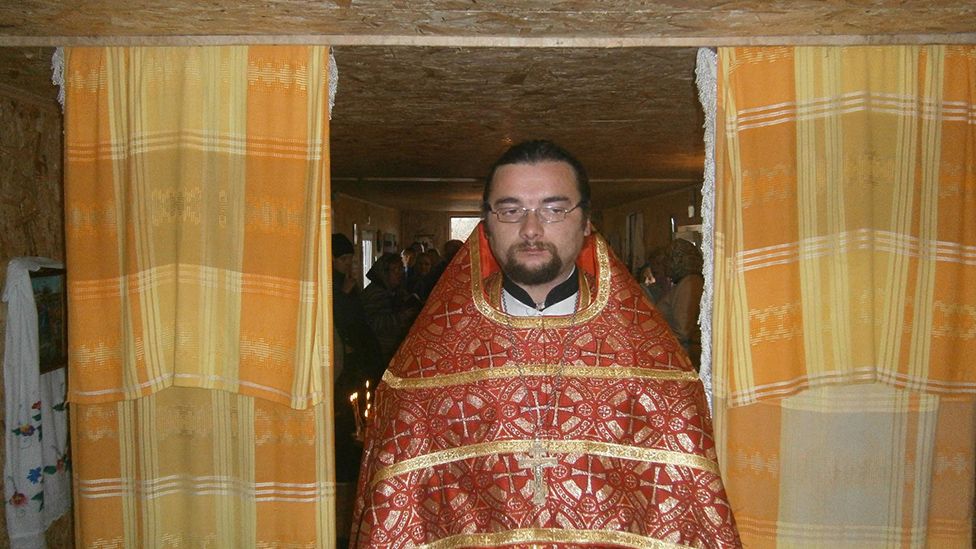Ukraine's Prosecutor General Iryna Venediktova has said the country is in the process of documenting thousands of incidents believed to contravene its criminal code on the rules of war.
As of 24 March, there have been 2,472 cases documented by her office. On Wednesday, Ms Venediktova outlined to the media how the country is handling these cases.
"Where we see that we will be successful in Ukrainian jurisdiction, and where the perpetrator of a crime will physically be in Ukraine, we will follow one strategy. If we understand that we are not able to have success in Ukraine, we will put our resources towards the International Criminal Court, so that a specific person, an individual, suffers the punishment."
The following is an account gathered by the BBC of just one of the incidents that have been logged as a suspected war crime.
It was just over a week into Russia's invasion of Ukraine. A group of volunteers - neighbours and friends - from the small village of Yasnohorodka, 40km west of Kyiv, had taken up their positions at a checkpoint guarding the entrance to the community.
Fighting between Russian and Ukrainian forces was already brutally fierce. Across the country, checkpoints were springing up at the entrance to towns and villages - mostly manned by local volunteers without any formal military training.
On the afternoon of 5 March, Rostyslav Dudarenko, the village priest, was at the Yasnohorodka checkpoint. His role was to check approaching vehicles. But like all military chaplains he was also there to offer the group spiritual support. He was dressed in civilian clothes.
It is not possible to establish exactly what happened, but one survivor of the attack, Yukhym (not his real name), told the BBC he had been manning the checkpoint with Dudarenko and around a dozen others when they learned three Russian tanks had driven through the village. He says the group decided to hide in the woods, ready to confront them if necessary.
As they approached the checkpoint, the Russian troops started "firing in all directions", Yukhym told the BBC. "When they realised we were hiding in the grass, they went off road to run us over with tanks."
He says the tanks had driven back to the road when Dudarenko decided to break cover.
"I saw Rostyslav raise the cross above his head, get up from his hideaway, screaming something and walking towards them. Perhaps he wanted to stop them. I tried to call him."
He says shots were then fired in the direction of the priest, and from his viewpoint at the time, they appeared to be aimed directly at Dudarenko. "And that was it. He made just a couple of steps and fell."
Yukhym, who himself was shot and injured in the attack, believes they would all have been killed if Ukraine's armed forces had not at that moment arrived to push the Russian forces back.
The voluntary group Dudarenko, 45, had joined had no military status. A couple had some military training - having previous experience in the long-running conflict with Russia in the Donbas in the east, according to another volunteer called Eduard (not his real name). Some were simply amateur hunters. Most were over the age of 50, he told the BBC.
Eduard, who was stationed at a different checkpoint, arrived just as the Russian tanks were driving away to find bodies scattered on the road. He said these included Dudarenko and his assistant - who had also been unarmed - two other defence volunteers and another person he did not know.
Dudarenko's mother Nadiia says her only son was determined to play his part.
"He wanted to be able to protect everyone," Nadiia told the BBC. "I tried to talk him out of it but I couldn't argue with him."

The group were armed with hunting rifles plus a small number of Russian army Kalashnikovs that had come into their possession, and had just three bulletproof vests between them. But as a priest, Dudarenko refused to bear arms, his friend and fellow priest Serhii Tsoma told the BBC.
This made him particularly vulnerable when he decided to confront the tanks, but such an action was in his nature, according to eyewitness Yukhym.
"Rostyslav was a kind and optimistic person. I think that's why he went to try and stop the Russians."
He was well known in Yasnohorodka as someone always ready to help others, driving round the village to collect older congregation members before Sunday mass, says his friend Tsoma.
His services themselves were also self-sacrificing, says one of his regular congregation, Tetyana Pylypchuk.
Dudarenko belonged to the Ukrainian Orthodox Church, which was finally granted independence from the Russian Orthodox Church in 2019, in a move never recognised by Russia.
Before the formal split, the Orthodox Church in Ukraine was divided between two branches, one loyal to Moscow, and one loyal to Kyiv. Although Dudarenko served in a church aligned with Kyiv, when pro-Russian former president Viktor Yanukovych took power in Ukraine in 2010 the Moscow Patriarchate began to take over Kyiv Patriarchate churches, including the one Dudarenko served in.
So rather than betray his principles, his friends say, he left the church and conducted his services out in the open - even in the rain. He later built a makeshift church in his trailer, with the help of donations.

"Our church is orphaned without you, Father," wrote Tetyana in a tribute on her Facebook page.
As has been the case with thousands of such incidents across the country over the past few weeks, the killings were swiftly logged by both the police and local and national public prosecutor's offices, with details published on their respective Facebook pages.
The cases - suspected contraventions of Ukraine's article 438: Violation of the rules of warfare - have also been uploaded on to a centralised website used by Ukraine's state institutions.
Ms Venediktova told the BBC in an interview recorded last week in English that such documentation of evidence was critical.
"In the office of prosecutor general we have a special department of war… all law enforcement agencies help us… to investigate war crimes. It's our main priority.
"Of course, we don't have enough investigators, that's why we created a common website - warcrimes.gov.ua." The website is used not just by the prosecutor general's office but by other state institutions such as Ukraine's Ministry of Foreign Affairs and Ministry of Justice, to document all evidence.
"It's very important for us," she explained. "[The evidence] should be acceptable in our Ukrainian courts, they should be acceptable in the ICC, and in other jurisdictions."
As for the 5 March incident in Yasnohorodka, once the investigation into the shooting has been concluded, a court indictment will be issued, says the Kyiv Oblast district prosecutor's office.
"The prosecution is doing everything to establish the circumstances of each and every war crime, and each and every perpetrator: from a soldier, to a general, to the high military and political leadership of the aggressor state," it said in a statement.
It added that in some cases Russian soldiers were already facing the first stage of Ukrainian prosecutions, "so we are not just talking about prospects of sentences in absentia. In each specific case war criminals will be punished in accordance with the law of Ukraine".
Latest Stories
-
Tens of thousands without water in Mayotte as curfew brought in
6 minutes -
ORAL: We won’t witch-hunt, we’ll focus on transparency, not revenge – Ablakwa
29 minutes -
Attempted robbery: Accused claims he carried cutlass for protection
46 minutes -
Embattled Liberian speaker questioned by police over parliament fire
3 hours -
‘I won’t be a judge in my own court; ORAL is about protecting public purse’ – Ablakwa
3 hours -
Bawumia joins thousands in Kumasi for burial prayers for Ashanti Regional Imam
3 hours -
Blue Gold Bogoso Prestea Limited challenges government actions in court
4 hours -
Verdicts due for 51 men in Pelicot mass rape trial that shook France
4 hours -
Syria not a threat to world, rebel leader Ahmed al-Sharaa tells BBC
4 hours -
Patrick Atangana Fouda: ‘A hero of the fight against HIV leaves us’
4 hours -
Trinity Oil MD Gabriel Kumi elected Board Chairman of Chamber of Oil Marketing Companies
5 hours -
ORAL campaign key to NDC’s election victory – North America Dema Naa
5 hours -
US Supreme Court to hear TikTok challenge to potential ban
5 hours -
Amazon faces US strike threat ahead of Christmas
6 hours -
Jaguar Land Rover electric car whistleblower sacked
6 hours

